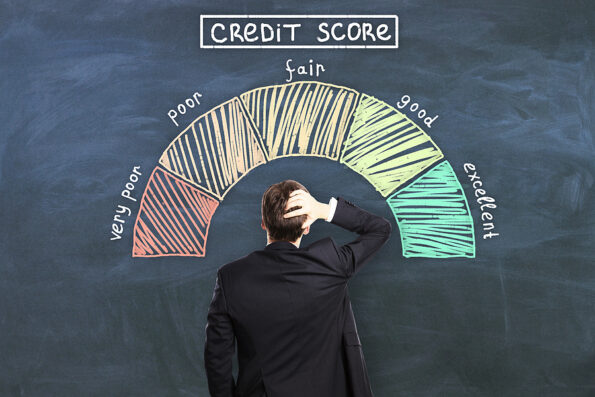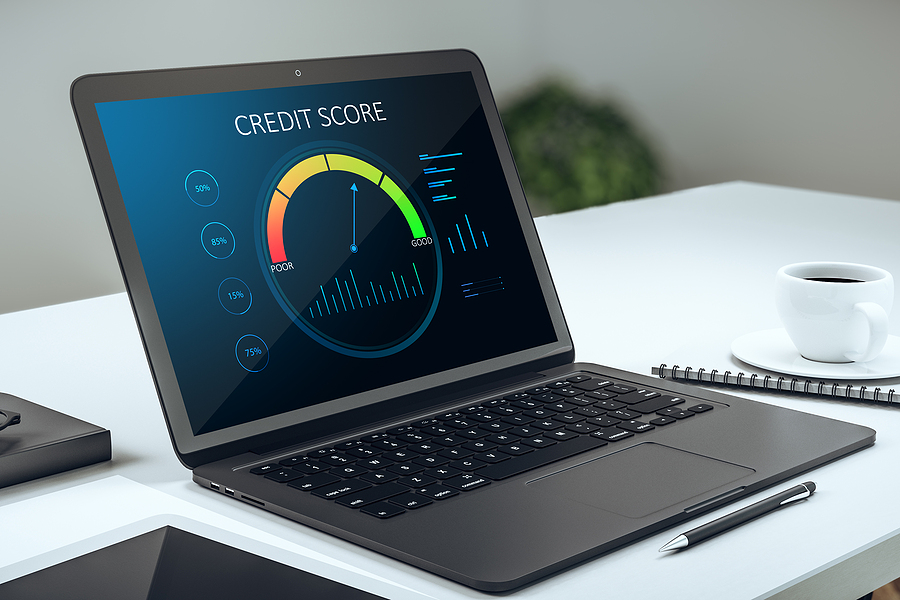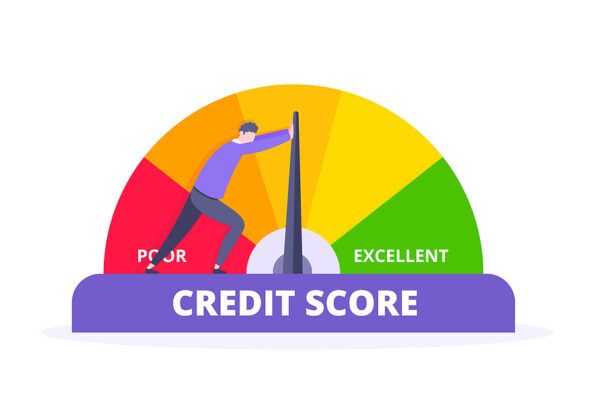Every consumer’s dream is to have a financially stable life, and he/she strives hard to achieve exactly that.
However, it is easier said than done. Because when it comes to applying strategies and practicing a healthy spending lifestyle, most of us become finance noobs. Like, there’s so much you can do:
- Get a secured credit card
- Build your credit score
- Follow a budgeting schedule
- Plan a finance reporting
- Improve credit rating
And so much more. Huh? Credit score and credit rating? Aren’t they the same? Uh? No? Then, what’s the difference?
Most importantly, how can they impact your financially stable life? Let’s find answers!
What Is Credit Rating?
Table of Contents
No, it’s not equivalent to your good credit report. Nope, it’s not an analog to your perfect credit score range.
Yes, you can relate your credit rating to your credit score and credit report, but they don’t define it. So, what actually means by the term credit rating?
“A credit rating is the analysis of a debtor’s credit risk factors.”
So, how is credit rating different from a credit report or credit score? Here is the answer:
Credit Rating Vs. Credit Report
To explain in simple and easy to understand language:
- Credit reporting is a subgroup of credit rating
- Credit rating is an assessment of credit risk, while credit reporting is the judgment of an applicant’s credit-worthiness
Credit Rating Vs. Credit Score
Well, this one can be quite confusing as both have similar concepts but for different groups:
- Credit ratings usually apply to government organizations, businesses, or sometimes individuals
- A credit score is only related to an individual
- Both evaluate the creditworthiness and liability of the group they’re associated to
Overall, the concept of credit rating can be applied to anyone who takes an interest in borrowing money. The entity can be an individual, business corporation, provincial state, or even a sovereign government organization.
What Is A Credit Rating Agency?
A credit rating agency is an authority that calculates the qualitative and quantitative liability of an application.
- It measures the risk factors of the entity (business, individual, government)
- Calculates the chances of the entity to meet the payment standards
- It analyzes whether or not the debtor can be confined to its debt principles and obligations
So, if you think that a bad credit rating can likely be the reason to reject your loan application or bill, you’re absolutely right!
Yes, it is that important for your financial stability.
Who Determines Credit Rating?
A credit rating is determined by an agency that considers certain entity factors to calculate the liability score. The top credit rating agencies that calculate credit rating are:
- S&P Global
- Moodys
- Fitch Ratings
However, the top credit bureaus can also work as credit rating agencies in certain areas like Canada. Here are the top agencies:
- Equifax
- TransUnion
- Experian
How Is Credit Rating Determined?
Well, to answer this in simple words:
Every agency has a set terminology when it comes to calculating credit rating. Still, the basics are quite similar.
They can assign you a score that the lending companies can then use to decide your application’s future.
Bonus: Click to read a detailed guide by SPGlobal on how credit rating works.
Why Credit Rating Matters For A Financially Stable Life?
Your credit rating and the report presents you in front of lenders, loan companies, and mortgage brokers.
The rating can decide whether or not you’ll get the loan. It can change the interest rates you are offered for the best. It can make you eligible for small or even large loans that can really change your financial condition.
So, is credit rating useful? Surely, it is!
- It can allow a business to take loans directly from the investor and without involving any bank or loan company
- For an individual, it shows to the mortgage lender how suitable as a candidate you are in terms of timely payments and loan closing
- A good credit rating will definitely help you earn the loan at better terms, premium rate, and interest value
- For a government, credit rating allows the firm to meet the credit risk requirements of an investor
Pros Of Credit Rating

A credit rating agency collects the data through various resources to give your application a deserving grade. And, that very grade can decide further whether or not you’ll get the loan.
So, what are the advantages and disadvantages of the credit rating process for the consumer?
First, let’s start with some pros:
1. A chance to increase resources
A good credit rating is directly related to your better financial health. So, it’s clear that it will improve your chances of finding better and more beneficial resources for your business or individual organization.
- Moreover, it can also help your company if you want to sell some shares or expand the revenue.
- A good credit rating will help you attract more investors and clients.
So, if you want your company to have the best revenue, start working to improve your credit rating.
2. Better loan rates
Good credit rating = Cheap premium rates!
You must have heard that a good credit score equals good credit life, so this shouldn’t be a new concept.
However, even if you’re not familiar with the finance world, let us say it out loud for you: your good credit rating can help you get the loan at a low premium rate.
Bonus: Here’s a helpful study by David Weliver to know what factors can cause the rejection of your loan, even with good credit.
3. No biased results
This might be a cool breeze for most famous establishments that fear rejection due to a competitor.
So, worry no more because a credit rating is calculated with complete transparency no matter who the entity is.
Now, you can’t have second thoughts with all the plus points that the investor might reject your loan application because your competitors decided to play dirty tricks.
4. Improved financial transactions
An excellent credit rating grade increases your chances of investment and loans, which can improve your cash flow.
- You can use financial aid to expand your business
- It can help you get a loan for renting an apartment
- It can make your organization stronger and make a firm place in the finance market
Is There Any Downfall Of Credit Rating?
Enough with all the benefits and advantages of modifying your financial situation with a good credit rating. Of course, nothing can be entirely positive even if standard and registered companies do it.
We know you’ve been waiting for this one, so let’s continue to read what are the drawbacks of a credit rating process:
1. Credit Rating Misinterpretation
As all the credit rating is based on the company’s current and past financial behaviors, there might be a chance it is calculated wrong.
- For instance, if the credit score or credit report had mistaken that were fixed later in the process
- If the background check was done when the company was suffering from a bad financial situation
One may also think of it as a biased result that involves someone with higher connections or a company that knows how to use resources to get the loan.
2. Static Research
Some may find the credit rating a mere calculation that can ruin your chances of loan. As there’s no guarantee what will happen in the future and there might be a turnover for your company.
- One may also believe that credit rating shouldn’t be a major credit risk calculating factor as it lessens the chances of a poor individual application
- The static research highly benefits the rich get richer and poor get poorer theory that can cause an imbalance in the society
Yes, your bad credit score and poor financial conditions play quite an important role in the credit rating, but there should be an additional factor that balances the equation of rich and poor.
3. Temporary Conditions Decide Permanent Effects
As we explained earlier, a credit rating background check verifies the current and past financial behavior. However, it can’t calculate or predict the future habits of the entity.
However, what it can definitely calculate is whether or not the debtor’s economic situation will become better or worse.
4. May Become The Reason Of Job Rejection
This downfall depends highly on the region you’re residing in because some states ban the evaluation of job applicants as per their credit rating and credit scores.
However, some states still allow the employer to do a background check of the individual finances.
So, even if you’re fully qualified for the job, you may still won’t get it because of your poor credit rating or credit score.
5. Portrays Wrong Image Of Applicant
Your credit rating gives your application a grade that decides the loan approval or denial. So, even if you faced a mishap or unexpected event that caused your rating to drop. Your application will still have a bad review.
FAQ’s
Understanding the concept of credit rating can be quite difficult for even a finance expert because there’s just so much to absorb in this field that one may find it written in a foreign language.
So, to help you deal with the information in the easiest way possible, we have listed down answers to some of the commonly asked questions revolving around the ‘credit rating’ topic.
Let’s move on to read them:
1. What is a good credit rating?
The individual credit rating depends highly on your credit score. You can say credit score and credit rating are directly proportional. The higher the credit score, the higher the credit rating, and the higher the chances of you getting the loan.
2. Why is credit rating crucial?
Credit rating is essential as it calculates the probability of the debtor paying back the borrowed money. It also hints towards the credit risk value of the individual, business, or government organization. High credit risk equals an increase in the premium rate of the loan.
3. What is the top credit rating agency?
Although every region has its own standard companies that calculate credit rating, Moody’s, Fitch Ratings, and Standard & Poor’s are the top worldwide accepted agencies. You might also come across Equifax, Experian, and TransUnion in Canada. The investment standard and terminologies may also differ, but they generally range from A, AA, AAA to C, CC, CCC, D (investment and speculative grades).
4. How does the credit rating work?
The credit rating agency assigns grades to the application, and the future of the loan highly depends on this grading. For instance, ‘AAA’ can make your application stronger by giving it a certificate of ‘likely to repay debt,’ whereas a ‘D’ can give it a ‘won’t pay’ or ‘worse grade’ status.
5. How is credit rating calculated?
There are various factors a credit rating agency checks while calculating your credit rating. They can range from:
- Credit score
- Payment history
- Financial stability
- Kind of Debt
- Repaying ability
- Level of Debt
- Borrowing history
And, the list goes on as per the company’s standards.
6. How to check credit rating?
You can request your credit bureau or credit rating agency for a detailed analysis of your report. Of course, the procedure and process depend on the bureau or agency you request. But, you can always find help on the official websites.
Bottom Line
Your credit score is an evaluation of your spending and saving habits, while your credit rating is an analysis of your creditworthiness and credit risk.
Together, they create a credit screening that can be beneficial in various situations. Moreover, it highly matters for your financially stable life because it makes your case stronger and shows lenders how well you can handle your credit.
But, of course, the terms and conditions and borrowing factors may vary depending on the type of credit rating and debt.
So, give this guide a thorough read to improve your chances at better premium rates and loan types. Lastly, don’t forget to check our other blogs to improve your financial condition and knowledge. Happy reading!
Image Source: BigStockPhoto.com (Licensed)
Site Disclaimer
The Content in this post and on this site is for informational and entertainment purposes only. You should not construe any such information or other material as legal, tax, investment, financial, or other advice. Nothing contained on our Site constitutes a solicitation, recommendation, endorsement, or offer by HII or any third party service provider to buy or sell any securities or other financial instruments.
Nothing in this post or on this site constitutes professional and/or financial advice. You alone assume the sole responsibility of evaluating the merits and risks associated with the use of any information or other content in this post or on this site.
You recognize that when making investments, an investor may get back less than the amount invested. Information on past performance, where given, is not necessarily a guide to future performance.
Related Categories: Money, Reviews








